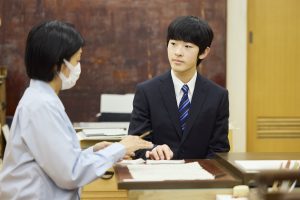This month, Prince Hisahito, the only son of Crown Prince Akishino and Crown Princess Kiko, will celebrate his 19th birthday and attend his coming-of-age ceremony. In the ceremony, known as the “Kakan no Gi,” he will wear a crown bestowed upon him by the emperor in presence of his parents, other imperial family members, and government representatives.
Hisahito is the first male member of the Imperial House of Japan to reach adulthood in nearly four decades. He is second in line to the Chrysanthemum Throne, which represents the world’s oldest continuous hereditary monarchy, as the heir to his father, Crown Prince Akishino.
In March 2025, Hisahito held his debut press conference as an adult member of Japan’s Imperial Family at the Akasaka Estate residence in Tokyo. During the press conference, the prince expressed a commitment to fulfilling his official duties “seriously and carefully,” while drawing on the guidance of others. He also spoke of his interest in social issues, including climate change and support for communities affected by natural disasters. Echoing the values of his grandfather, Emperor Emeritus Akihito, and uncle, Emperor Naruhito, he stressed that an emperor should “always think of the people.”
In April 2025, Hisahito began studying biology at the School of Life and Environmental Sciences at the University of Tsukuba in Ibaraki Prefecture. He commutes to school from his imperial residence in Tokyo by car for the time being but is expected to divide his time between Tokyo and an apartment rented near the university as his studies progress, according to an aide.
His enrollment followed an application through the university’s recommendation exam system, which involved a written essay and an interview. He was reportedly inspired to apply after visiting the university in June 2024 during an event held by his high school, the University of Tsukuba Senior High School in Tokyo. The university’s strong biological research and the supportive natural environment are assumed to be key factors in his decision.
Hisahito has shown an academic interest in entomology, particularly the study of dragonflies and urban insect conservation. He has a hobby of cultivating vegetables and rice despite challenges from pests and birds. In November 2023, he published a co-authored paper titled “Odonata Fauna of Akasaka Imperial Gardens, Tokyo: Diversity Sustained by Continuous Maintenance.” In August 2024, he presented findings from this joint research at the 27th International Congress of Entomology in a poster format.
However, Hisahito’s academic path has not been free from controversy. In August 2024, an online petition was launched in response to media speculation over a potential “back-door” admission of the prince to the University of Tokyo. The petition reflected public concerns about fairness in the admission process. In September 2024, a senior official of the Imperial Household Agency dismissed the claims as “groundless” rumors.
Today, Japan’s imperial family has a ceremonial role as the symbol of the state and the unity of the people. They have no executive or military powers under the 1947 postwar constitution. The prince’s academic path aligns with the postwar tradition of Japanese royals staying away from politics and studying biology, literature, and the arts. For example, Emperor Naruhito specialized in water transport, Emperor Emeritus Akihito studied fish, and Crown Prince Akishino studied chickens.
Beyond academics, the prince has embraced college life, reportedly joining the university’s badminton club. In July 2025, he was seen with fellow club members in front of a Matsuya restaurant, a ubiquitous beef bowl chain in Japan, with a badminton racket slung over his shoulder.
His fresh and relatable “ordinary college student” image probably bolstered public support, especially among young people, and softened earlier controversies, such as media speculation about a “back-door” admission to the University of Tokyo in 2024 and plagiarism allegations related to an award-winning essay in a children’s non-fiction literature competition in Fukuoka in 2022.
Hisahito’s position as the only eligible male heir to the Chrysanthemum Throne has generated public discussion around Japan’s male-only imperial succession system, as defined by the 1947 Imperial House Law. Only male descendants can inherit the throne, and female royals lose their royal status upon marrying commoners. This has barred Princess Aiko, the only child of Emperor Naruhito and Empress Masako, from ascending the throne despite her direct line of descent.
Recent surveys show strong public support for permitting a female emperor. For example, a May 2024 Mainichi Shimbun poll found that around 81 percent of respondents favor allowing women to ascend to the throne. Similarly, a September 2019 survey by NHK Broadcasting Culture Research Institute found that around 70 percent of the respondents favor allowing a female emperor. The trend extends beyond succession. A May 2025 Jiji Press poll found that 65 percent support allowing female imperial family members to retain their status after marriage, while only 11 percent oppose it.
Beyond high public support rates for female succession, the U.N. Committee on the Elimination of Discrimination against Women (CEDAW) recommended that Japan revise its male-only imperial succession to ensure gender equality in a published report in 2024. On a practical level, as the number of eligible male heirs continues to shrink, concerns are growing about a future succession crisis in Japan.
Despite these push factors, debate has continued among parties and lawmakers. Conservative resistance has stalled legal changes, with opponents citing the importance of preserving Japan’s patrilineal tradition, imperial legitimacy, national identity, and cultural continuity. At the same time, some lawmakers have proposed some institutional alternatives as moderate solutions, such as reincorporating former cadet branches of the imperial family and allowing princesses to remain in the imperial family but barring their descendants from the throne.

































